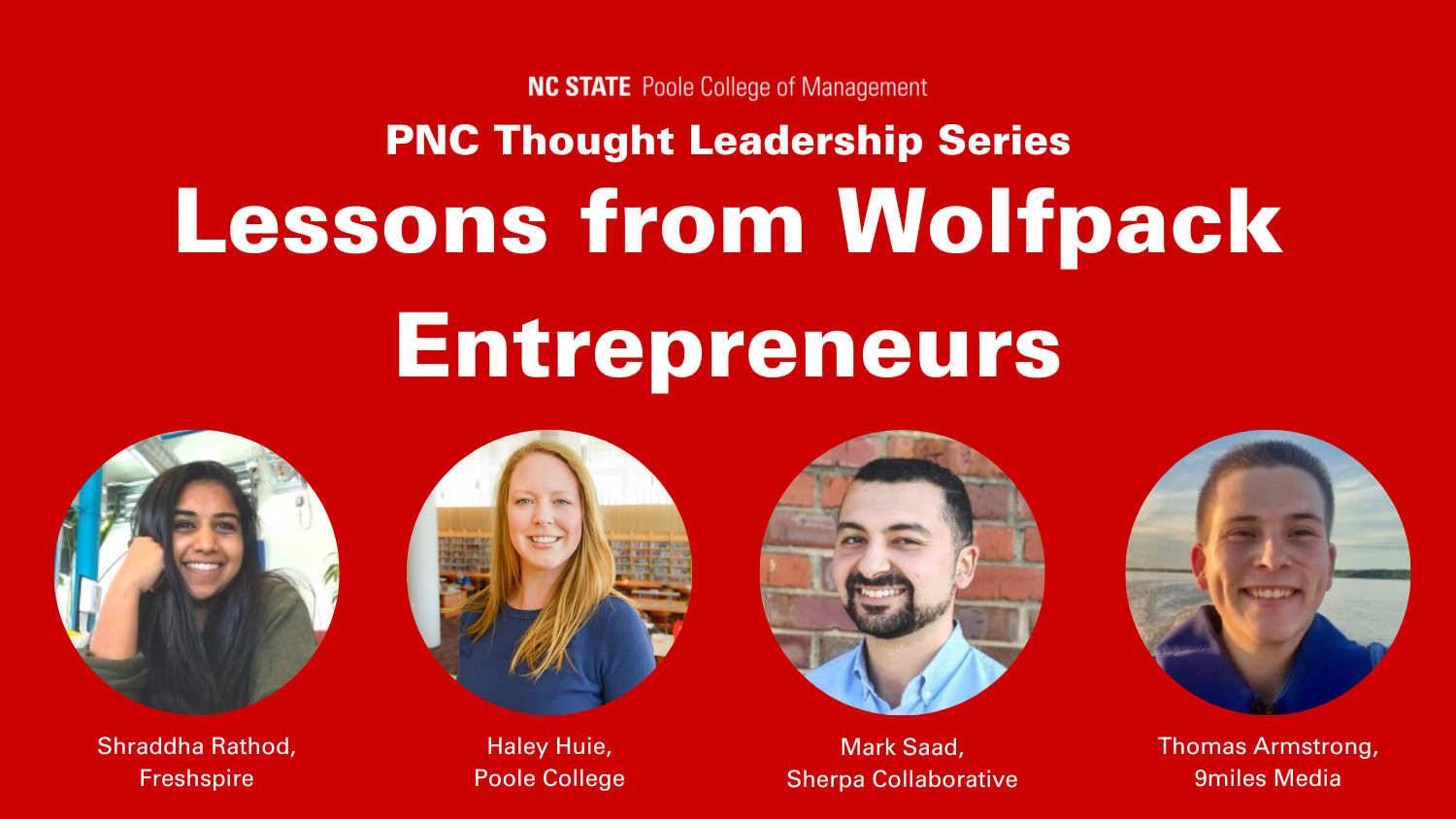NC State Poole College of Management hosted the fall edition of the biannual PNC Thought Leadership Series on October 18 focused on entrepreneurship.
Demetris Cheatham, Poole College lecturer in management, innovation and entrepreneurship, led the panel of experts, including:
Thomas Armstrong, COO, 9miles Media
Thomas Armstrong graduated from Poole College of Management in 2020. Armstrong is a serial entrepreneur who began working on ventures during his time as an undergraduate student. He is the COO of 9miles Media, a downtown Raleigh based video production agency, and co-founder of Entrepreneur House, a co-living community for young entrepreneurs. He is also passionate about helping aspiring entrepreneurs understand their “why” and connect with other valuable innovators.
Haley Huie, director, NC State Entrepreneurship Clinic
Haley Huie joined Poole College of Management in April 2022 as the director of the Entrepreneurship Clinic and as a professor of practice. Huie brings a variety of industry experience beginning as a journalist in northern Virginia, an advisor and instructor in higher education and as a business and strategy consultant for a school group on the west coast. Most recently, she spent her time in student-facing programs at NC State in her role as director for experiential learning where she had the chance to build the living-learning community for student entrepreneurs at NC State. She led other signature programs such as the Entrepreneurship Garage, Jump Start summer camp and helped begin the annual Make-A-Thon sustainability challenge on campus.
Shraddha Rathod, founder, Freshspire
Shraddha is the founder of Freshspire, a start-up that makes buying and selling local food accessible. She makes software that allows wholesale food buyers and local farmers to help plan and place orders effectively, and provides data to best assist in that process. In the past few years of starting the company, Freshspire has worked with private companies and local government, including Wake County and Orange County. Shraddha is passionate about mission-driven companies and social entrepreneurship – especially when it comes to technology products. Shraddha studied electrical & computer engineering at NC State.
Mark Saad, founding partner, Sherpa Collaborative
Mark Saad is a proud Raleigh native that loves problem-solving. Soon after graduating in with a bachelor’s degree in business administration with concentrations in finance and entrepreneurship from NC State in 2008, Saad founded Flat World Trading Co., an organization specializing in consumer product sourcing. In 2010, he founded the Kinder Soles footwear brand until it was acquired by Feelgoodz Holding, Inc., where he became CFO. From 2013 to 2018, Saad served as Feelgoodz Holding’s CEO, leading the company to 500% growth. In 2019, Saad co-founded Sherpa Collaborative, bringing his talents and “non-traditional” strategies to earn other companies an impressive market share.
Key Highlights
What is the greater good you’re trying to address?
Thomas: It’s not as much about the work as about the culture we’re able to create at the company. The work is obviously very important but…I’m able to create an environment where these 10 people love coming into work every single day. They feel like they belong to a cause bigger than themselves…They feel like they have the right environment to do the best work they possibly can.
Shraddha: I had an innate need to make a difference in this world…It started off with this surface-level statistic that 40 percent of our food goes into landfills…As an engineer, I thought efficiency, technology could really help this problem…Once I put myself in that industry, I realized I had a place at the table and could make that difference…Your why is so important to help yourself wake up every morning and do what you need to do.
What are some of the things the Entrepreneurship Clinic offers to students to help them understand what problem they’re trying to solve and why they should become an entrepreneur?
Haley: One thing we do in the Entrepreneurship Clinic is help you become comfortable with ambiguity and uncertainty…Your why can take a lot of different forms. My why became how I can accelerate people’s careers…The things we try to expose you to in the clinic are solving real-world problems for real organizations that exist to create value and hopefully to create a huge difference and make an impact on our state.
Any advice for students contemplating being a full-time student and an entrepreneur or starting their full-time careers and doing an entrepreneurship venture?
Thomas: I disagree with the idea that it’s impossible to start something while you’re in college. I did two days of classes at Poole College of Management, it was awesome, and then I did three days of working on the startup downtown.
Haley: It lowers the barrier for you if you have some income coming in, so that was the reason I started something while working full time. It gives you the flexibility and freedom to test a concept and try something out…When you sit in the student seat, you should know how many resources, people, places and things want you to be successful in trying out some of those concepts…Take advantage of all the things on campus and this runway you have as a student.
How do you balance your social mission with profit?
Mark: In the consumer product world, there aren’t nearly as many investors as there are in tech or software…so profit is very important for us, but it is a balance between people and profit. You can’t lose sight and just completely sell your soul for the sake of profit.
Shraddha: Almost whatever decision we made and whatever sale we made, we could help the triple bottom line. That means we could affect our community, we could help ourselves, and we could give a return to everyone involved…If you are providing something that people need then you will get paid.
How do you fund your businesses?
Thomas: So far, it’s all been bootstrapped, which means we make money and reinvest the money back into the company…I’ve really loved being able to do that…hiring more people, getting more equipment, whatever that might be.
Shraddha: We’re also bootstrapped, but the way we got started was in college. We did a lot of business plan competitions, e-games, almost everything single thing NC State has to offer. And also every single thing our country has to offer, we were applying for it. In that way, we were able to get our idea out, get our plans out, really hone down communication of our story.
Mark: We did not bootstrap Feelgoodz because we had to buy a lot of inventory, and it’s harder in the consumer products space. The lead investor was the entrepreneur-in-residence at NC State when I was an undergraduate…As the company grew…we ended up doing it via debt financing, which was fantastic. We didn’t have to give up a ton of equity.
Haley: We run a program called the Andrews Launch Accelerator, which over the summer helps us accelerate the growth of between three and five companies…Fundraising is at the front of all of these companies’ minds…They empower this network of people they’ve met throughout this fantastic experience to help them make connections and help make them more investable. Bootstrapping is a solid path. If you’re growing a traditional service-based business, perhaps SBA loans are a great path, private equity, individual angel investors, friends, family, there are so many different avenues.
For college students who want to start a business or someone who recently graduated, how did you overcome those perceptions from people thinking that you’re just a kid with an idea versus no, I have a real business idea?
Thomas: I was at every single entrepreneurship mentors event they had while I was at NC State…I grew in confidence so much that I could just walk up to people and start talking and carry on a conversation…That confidence served me so much when I wanted to start different businesses because people started taking me more seriously because I was taking myself more seriously.
Shraddha: Even if you are struggling with confidence, I think it’s definitely a mindset that you have to practice…If you’re able to put yourself in places that help you practice that, that makes a lot of difference.
Mark: As far as what we look for, if it’s somebody young, fresh out of school, the number one characteristic for us is they’re coachable…When you talk to folks in the entrepreneurial space, make sure that you’re taking notes, you’re listening, you’re not trying to argue with every point they make.
Haley: What do we look for in the Entrepreneurship Clinic when students reach us, and we’re the springboard into the world beyond college? Tenacity, people who are not afraid to ask questions and put themselves in the right spaces, people who are very open, which goes back to coachability. They’re really interested and invested…The extra step is people who do their due diligence…It certainly helps build a strong bridge when you know something about the person you’re talking to, and you have a goal in mind for that conversation.
- Categories:
- Series:



